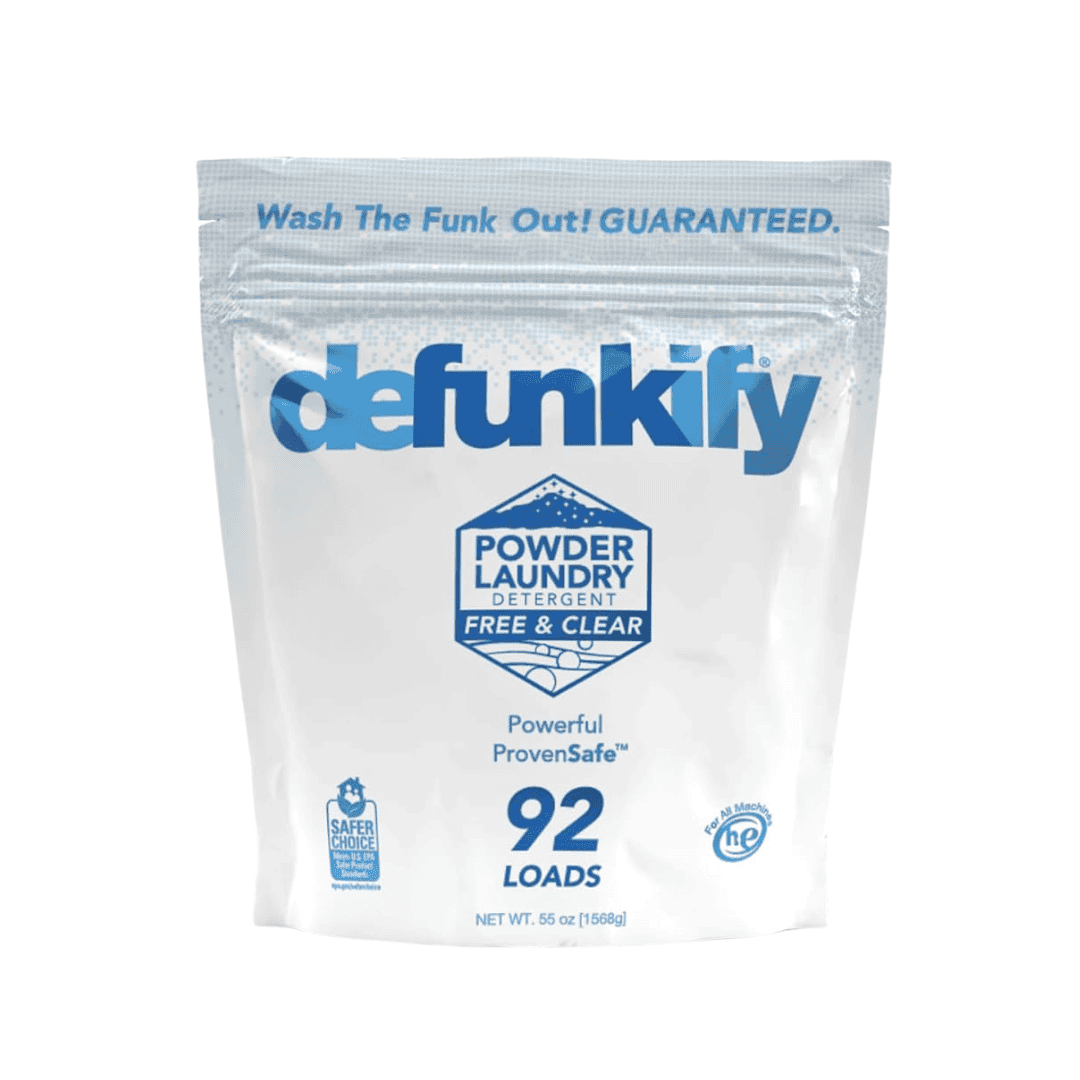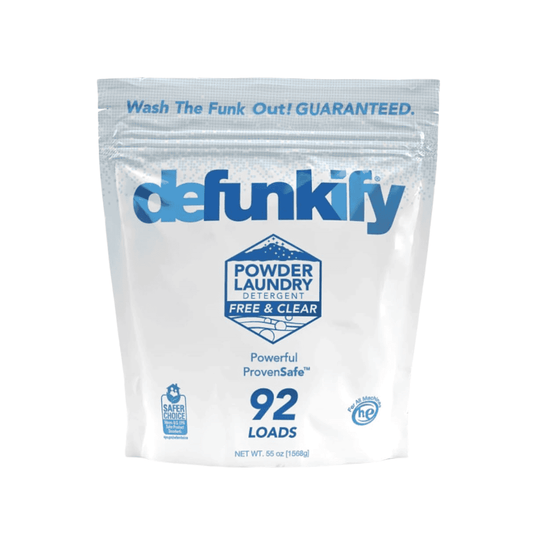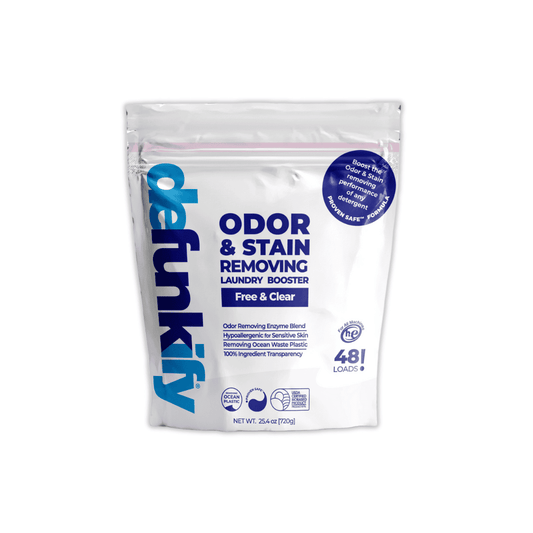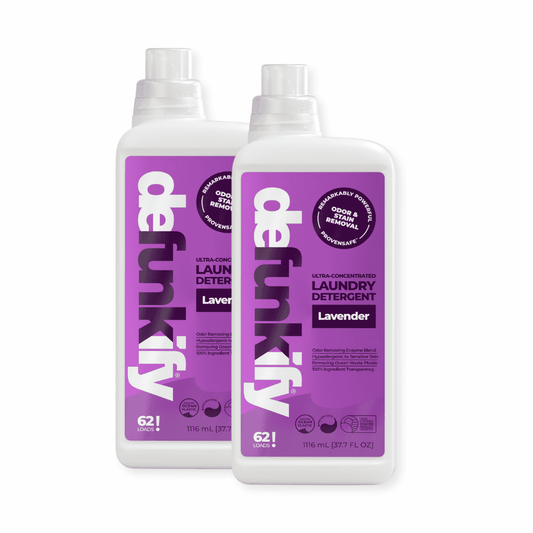
A year without new clothing.
Share
Hi, I'm Casey - Defunkify Marketing Manager, mom of three, outdoor enthusiast and major champion of the planet commonly referred to as:
- Earth
- 3rd rock from the sun
- Home
- Blue planet
- Etc...
Tomato, To-mah-to. Doesn't matter. What does matter is that as a lover of this lil' blue-green marble orbiting around the sun, I've challenged myself to go an entire year without making a new non-essential clothing purchase.
Why? Read on.

In a world of fast fashion and constantly changing trends, it's easy to get caught up in the excitement of purchasing new clothes. However, as our awareness of environmental issues grows, so does the need for a more sustainable approach to our fashion choices. This realization has led me to make a conscious decision to minimize my new clothing purchases, with exceptions for essential items like my running shoes (and underwear!).
In this blog post, I will delve into the reasons behind this choice, focusing on sustainability and waste reduction.
The Environmental Impact of Fast Fashion:
Fast fashion, characterized by rapid production and consumption of low-quality garments, has a significant ecological footprint. From the extensive use of natural resources to the emission of greenhouse gases, the fashion industry's impact on the environment is substantial. By reducing my new clothing purchases, I aim to minimize my contribution to these harmful effects.
My suggestion to those reading? If you're going to make a clothing purchase - spend more on a high quality item that will last.
Water Consumption and Pollution:
The fashion industry is notorious for its excessive water usage and pollution. From the cultivation of raw materials like cotton to the dyeing and finishing processes, fashion production consumes vast amounts of water, often in regions already facing water scarcity. Furthermore, the release of untreated wastewater contaminates rivers and oceans, adversely affecting aquatic ecosystems. By extending the lifespan of my clothing and opting for secondhand or sustainably produced garments, I can help conserve water resources and reduce pollution.
Speaking of water consumption, you will need to wash your own clothing less often if you use a high-performance detergent like Defunkify... Oh, and your garments will stay in like new condition when you clean with a detergent that's tough on smells and stains but gentle on fabrics and your skin.
Textile Waste and Landfill Overflow:
So. Much. Waste. Our throwaway culture has resulted in a staggering amount of textile waste. Many garments end up in landfills, where they take years to decompose due to synthetic fibers. By embracing a more conscious approach to clothing consumption, I can reduce my contribution to this waste crisis. By repairing, upcycling, or donating clothing instead of disposing of it, I can extend its life cycle and minimize its impact on the environment.
Don't cancel your clothes, repurpose them!
Embracing Minimalism and Personal Style - and Shop Second Hand:
Reducing my new clothing purchases allows me to embrace a minimalist mindset and cultivate my personal style - currently it's in a 'lack thereof' state. Instead of constantly chasing the latest trends (which I admittedly do not do), I can curate a versatile wardrobe with timeless pieces that reflect my individuality. By prioritizing quality over quantity, I can create a more sustainable fashion identity that transcends the fleeting nature of fast fashion.
It's also worth noting that abstaining from buying new clothing doesn't mean I can’t still acquire new pieces through secondhand shopping, clothing swaps, or renting clothes for special occasions. These options will allow me to experiment with fashion and keep my wardrobe fresh without contributing to the negative impact of new production.
Concerned about purchasing previously worn clothing? HINT: Wash your recent secondhand purchases with a laundry detergent that gets fabrics truly clean by removing smells and stains at the microscopic level without covering anything up with fake fragrances.
In conclusion, choosing to limit my new clothing purchases, except for running shoes and my skivvies, is a conscious decision rooted in sustainability and waste reduction. By reducing my contribution to the harmful environmental impacts of the fashion industry, I aim to support a more ethical and sustainable future. Embracing a mindful approach to fashion not only benefits the planet but also allows me to cultivate a personal style that is built on durability, versatility, and timeless elegance. Together, let's rethink our relationship with clothing and pave the way for a more sustainable fashion industry.
Join me next year as I explore a year without showering! (this is a joke)




